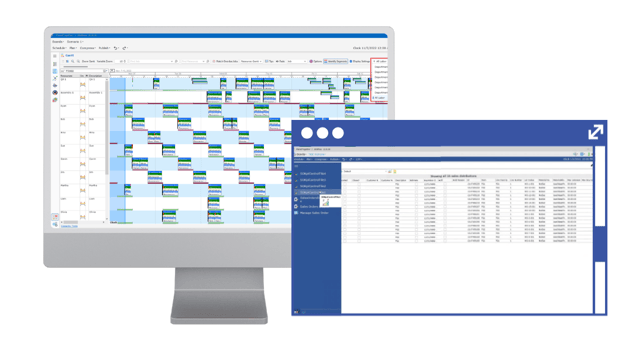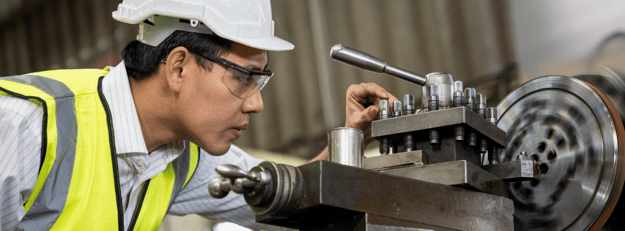Technology impacts the everyday life of most people within the United States. Smartphones, laptops, and other forms of technology have become a necessity for everyday life - which means that it has integrated with most of our jobs as well. One of the areas where technology has become prevalent is in the manufacturing industry.

What is Manufacturing Technology?
Manufacturing technology refers to the broad range of processes, techniques, and tools used in the production of goods or products. It encompasses various aspects of the manufacturing process, from the design and creation of a product to its final assembly and distribution. The primary goal of manufacturing technology is to efficiently and cost-effectively transform raw materials into finished products.

Advantages of Manufacturing Technology
With manufacturing technology, there are various benefits that improve a production facility with ease. The advantages of manufacturing technology include the following:
- Increase in Quality - Quality enhancement is by far one of the main beneficial components of manufacturing technology. With production software, humans are needed less in all aspects of production planning and scheduling, as well as the actual production process itself. Automation in the creation of schedules and production line means an optimized schedule that reduced the number of inefficiencies, defects, and other mishaps. This is because humans are more prone to error than programmed machines are, so it is obvious why many production facilities are choosing to use robots and automation instead of having a large number of workers within the plant.
- Cost Reduction - Cost reduction is one of the key goals of manufacturing technology. This is because of the correction of inefficiencies and waste being reduced within the production process, which saves a drastic amount of money in the long run. Manufacturing technologies improve overall productivity, which increases profit immensely as well. In addition, technology and automation usually mean that you require fewer workers in the plant, which is typically the largest cost incurred by a manufacturing company.
- Reduction in Overall Production Time -The longer the production process is - the more it is going to cost. Manufacturing technologies drive the production process and get products out in a much more efficient manner. This is all thanks to machines automating the process, in which production time is drastically reduced between product batches, ultimately allowing for the manufacturing operation to increase profits. In addition, using machines to automate the production process means that you have a consistent run rate for production that can be used to more accurately predict when you can deliver your goods.
- Data-Driven Forecasting and Planning - Advances in AI and production planning and scheduling means that you will be able to match your supply chain with actual customer demand more accurately. This will allow many manufacturers to only produce what is needed to supply the customer demand and avoid creating waste due to overproduction driven by poor forecasting.
Overall, there are many advantages of manufacturing technology that easily help boost production, ultimately saving the production facility money and ensuring that production is on time and efficient.
Disadvantages of Manufacturing Technology
Along with the various advantages of manufacturing technology, there are also disadvantages pertaining to the technology as well. The disadvantages of manufacturing technology include the following:
- Limited Creativity - Manufacturing technology completely limits creativity due to the abundance of automation/machinery and lack of employees within the production facility. Employees are able to brainstorm while counteracting a particular problem, while machinery is only optimized to do as it is told, even if there are issues.
- High Initial Cost - Many manufacturers are intrigued by the cost-reduction benefits of implementing automation and technology within their manufacturing facility. While the benefits can help cut costs and ultimately increase profits, there can be high initial investment costs involved. It is important to adequately evaluate the long-term benefits of adding various types of technology within your operations to determine whether the initial implementation cost will be worth it.
- Contribution to Environmental Issues - Global warming is a large concern for many individuals around the globe - with manufacturing being a substantial contributor to it. Manufacturing technology means more equipment and technology being incorporated with production facilities, which has negative impacts on the environment due to the various fuel sources such as gasses and chemicals required to run it. In addition, a more efficient production line means that you can increase your overall production amount - leading to more waste and other emissions.
- Unemployment Increase - Unemployment has been a significant concern for manufacturing since automation began to play a role. Ever since manufacturing technologies have become prevalent, there has been much concern over what that means for human labor within manufacturing facilities. For many, adding more machines and automated processes means that less labor is required. On the other hand, more of your employees’ time can now be dedicated to high-value tasks that will help grow your business.
If you are involved with manufacturing, you are aware that manufacturing technology is a must in order to keep up with competition and to ensure that products are made efficiently. Whether your concerns pertain to global warming or how manufacturing may hurt the environment, manufacturing technologies aid in eliminating waste and ultimately enable manufacturing facilities to utilize resources to their fullest extent.
PlanetTogether enables us to provide a quality product to our customers in a timely manner.GREGORY VAN LEIRSBURG, PRODUCTION SCHEDULER, STANDARD PROCESS SUPPLEMENTS
One of the most popular forms of manufacturing technology includes Advanced Planning and Scheduling Software (APS), which enables manufacturers to have a visual representation of their production schedule and establish insight into the entire process.
Advanced Planning and Scheduling Software
Advanced Planning and Scheduling Softwares have become a must for modern-day manufacturing operations as customer demand for increased product assortment, fast delivery, and downward cost pressures become prevalent. These systems help planners save time while providing greater agility in updating ever-changing priorities, production schedules, and inventory plans. APS Systems can be quickly integrated with an ERP/MRP software to fill the gaps where these systems lack planning and scheduling flexibility, accuracy, and efficiency.
With PlanetTogether, you can:
- Create optimized schedules balancing production efficiency and delivery performance
- Maximize output on bottleneck resources to increase revenue
- Synchronize supply with demand to reduce inventories
- Provide company-wide visibility to capacity
- Enable scenario data-driven decision making
The implementation of an Advanced Planning and Scheduling (APS) Software will take your manufacturing operations to the next level of production efficiency by taking advantage of the operational data you already possess in your ERP system. APS is a step in the right direction of efficiency and lean manufacturing production enhancement. Try out a free trial or demo!
Related Capacity Planning Video
APS Resources
Topics: manufacturing technology, manufacturing scheduling and planning software, Manufacturing Scheduling




















LEAVE A COMMENT